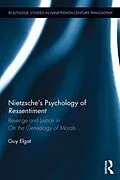Ressentiment-the hateful desire for revenge-plays a pivotal role in Nietzsche's On the Genealogy of Morals. Ressentiment explains the formation of bad conscience, guilt, asceticism, and, most importantly, it motivates the "slave revolt" that gives rise to Western morality's values. This book brings it sharply into focus and provides the first detailed examination of Nietzsche's psychology of ressentiment. It shows how ressentiment, despite its blindness to justice, gives rise to moral justice-the central target of Nietzsche's critique. The result provides a novel view of Nietzsche's moral psychology in the Genealogy, his critique of morality, and his views on justice.
Autorentext
Guy Elgat is a Lecturer at the School of the Art Institute of Chicago. His work has appeared in the British Journal for the History of Philosophy, History of Philosophy Quarterly, and The Journal of Nietzsche Studies.
Inhalt
Introduction
1. Ressentiment as the 'Home of Justice'?
2. The Psychology of Ressentiment
3. Resentiment's Injustice
4. Slave Revolt, Self-Deception, the Free Subject
5. Interlude: Bad Conscience, Guilt, and the Priestly Ascetic Ideal
6. The Emergence of Moral Justice
7. A Genealogy of the Capacity to be Just to Others
